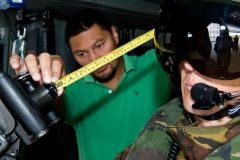Stephven Kolose

Human Factors Scientist
Defence Technology Agency (DTA)
right: Stephven Kolose - measuring for safety
Stephven Kolose obtained a Bachelor of Science in Psychology at the University of Otago and it was 300-level paper in Ergonomics (Forensic and Applied Psychology) with Associate Professor David O'Hare which set his career in Ergonomics and Human Factors in motion.
“I fell in love with Ergonomics because I was fascinated with how technology can influence our behaviour and performance, particularly when we are under pressure. Half way through the semester I knew that I wanted a career in Ergonomics. I didn't want a career confined to a lab – rather, one that would involve getting out in the field and speaking directly to users - getting their perspective on how to improve their everyday work.”
After completing his Psychology degree, Stephven pursued both a Postgraduate Diploma in Ergonomics (PGDipErg) and in Aviation (PGDipAv) at Massey University before being awarded a Loughborough University International scholarship towards a Master of Science (MSc) in Ergonomics and Human Factors. Loughborough University in England offers one the most prestigious Ergonomics courses in the world.
After his studies, Stephven remained in the UK as a Human Factors Consultant working on projects spanning Medical device ergonomics, to the Human Factors considerations in the design of the London Underground stations.
One of his highlights overseas was working on the 2007 UK Ergonomics Society Conference Secretariat Committee for their annual conference in Nottingham. Out of 200 applicants from around the UK, Stephven was one of only five people who were chosen for the secretariat.
“One of the best things about the secretariat was meeting those who authored many of my fat Ergonomics textbooks back at Otago and Massey. They spoke highly of the research coming out of New Zealand which is a credit to the NZ Ergonomics and human factors community.”Stephven is DTA's project leader for human factors research for the Air force, and New Zealand's representative on the Human Systems Performance in the Air panel within the Technical Co-operation Program (TTCP). The TTCP is an international defence science collaboration amongst Australia, Canada, New Zealand, United Kingdom and the United States.
Over the past six years at DTA, the agency responsible for NZ Defence Force's research, science and technology, Stephven has been part of various projects. Some of those include, assessing the usability/ergonomics of light support weapons; assessing hearing protection devices and long range acoustic devices; providing input into HF training; and ergonomic assessments of helicopter cabin seating and brace procedures.
Stephven is also a qualified Anthropometrist (the study of body measurements and body composition) and is currently planning the first NZDF-wide Anthropometric Survey. The survey will involve capturing body measurements of approximately 900 NZDF personnel using a state of the art 3D whole body laser scanner and traditional anthropometry equipment.
“Having a database of actual NZDF personnel body dimensions would mean that we could design or purchase equipment, clothing, weapons, platforms which best 'fit' our user population”.
Stephven is currently working towards a PhD in 3D Anthropometry at AUT University.
“To this day I credit my Psychology degree at Otago University as the inspiration behind my move to Ergonomics and Human Factors”.
